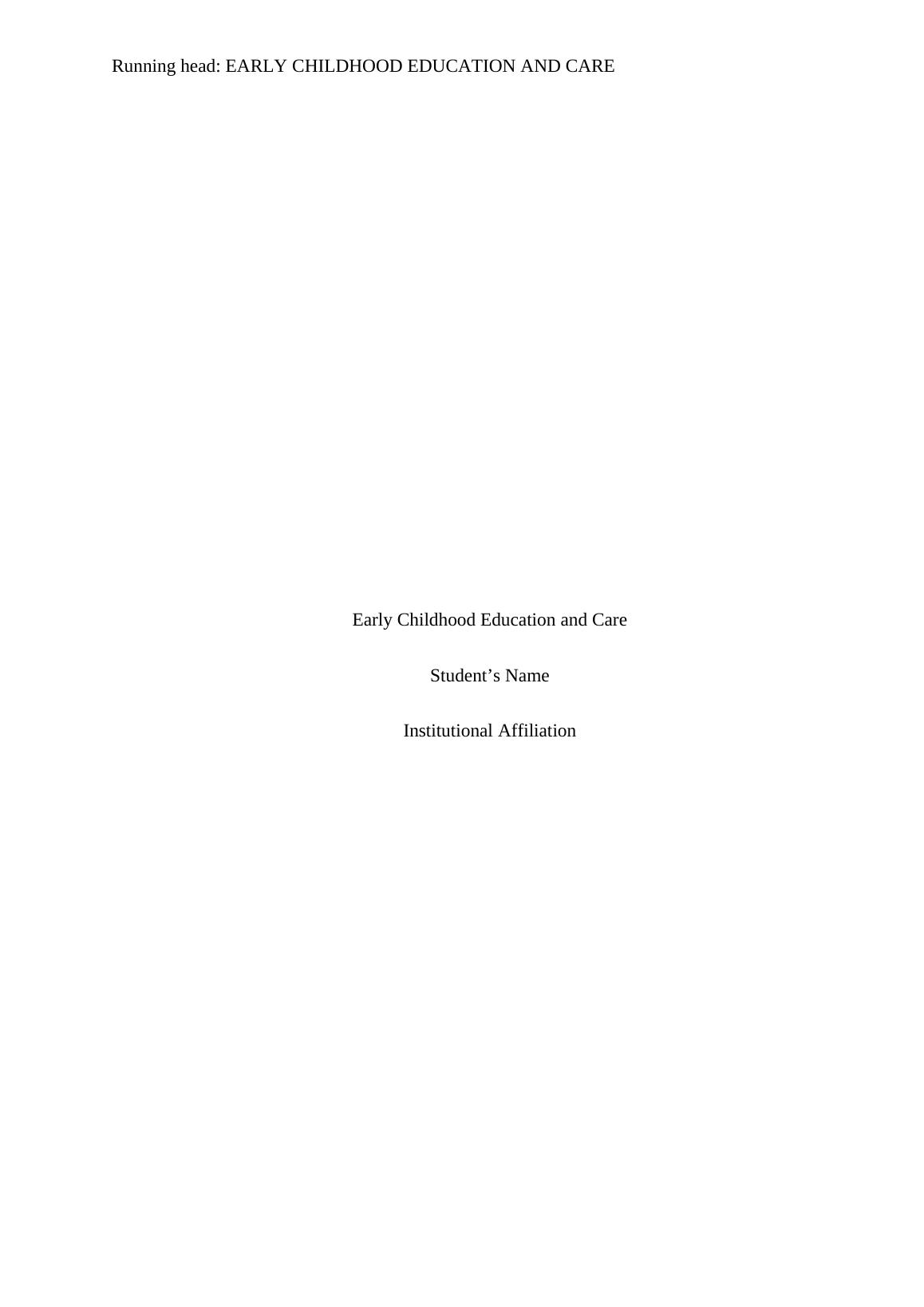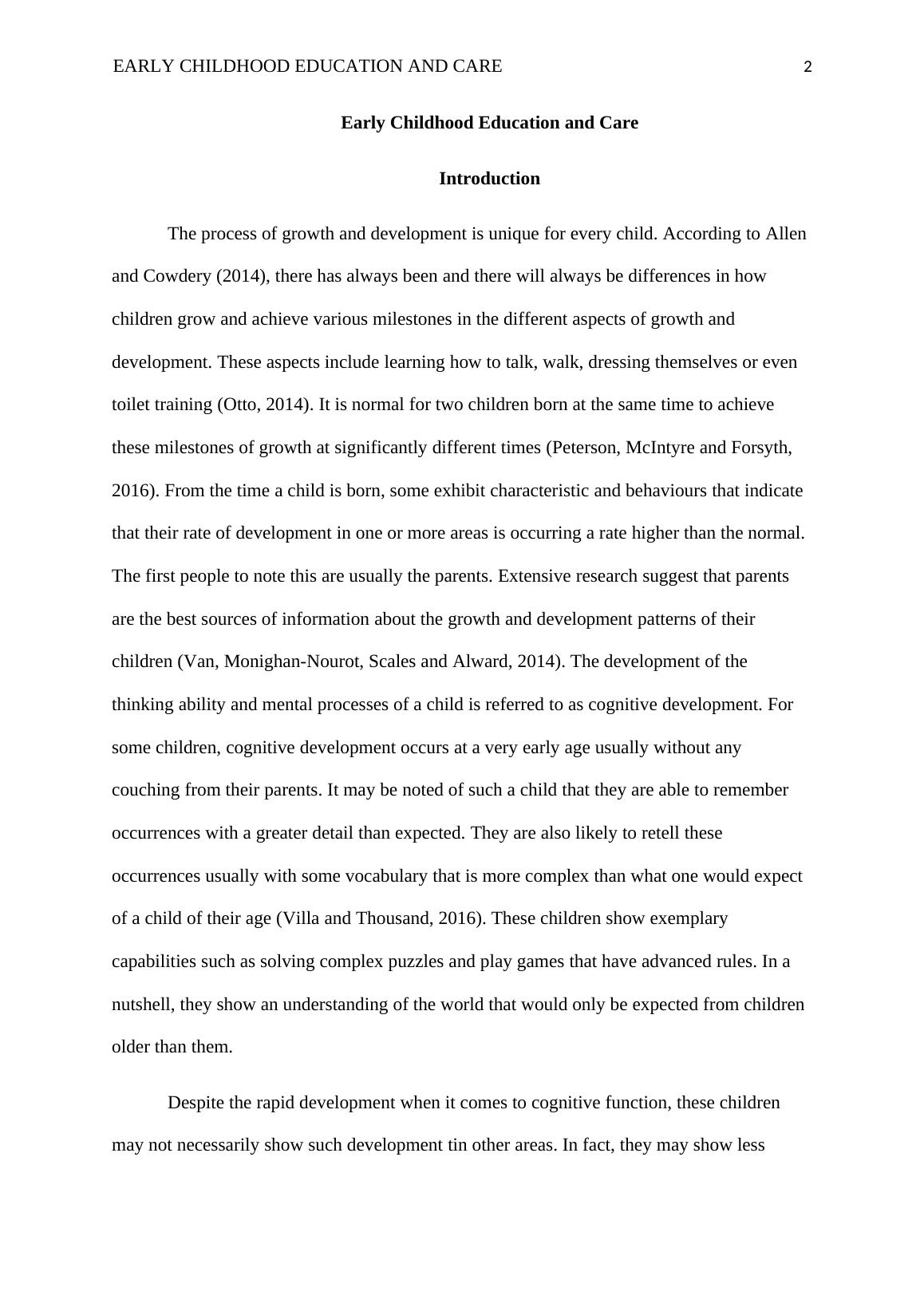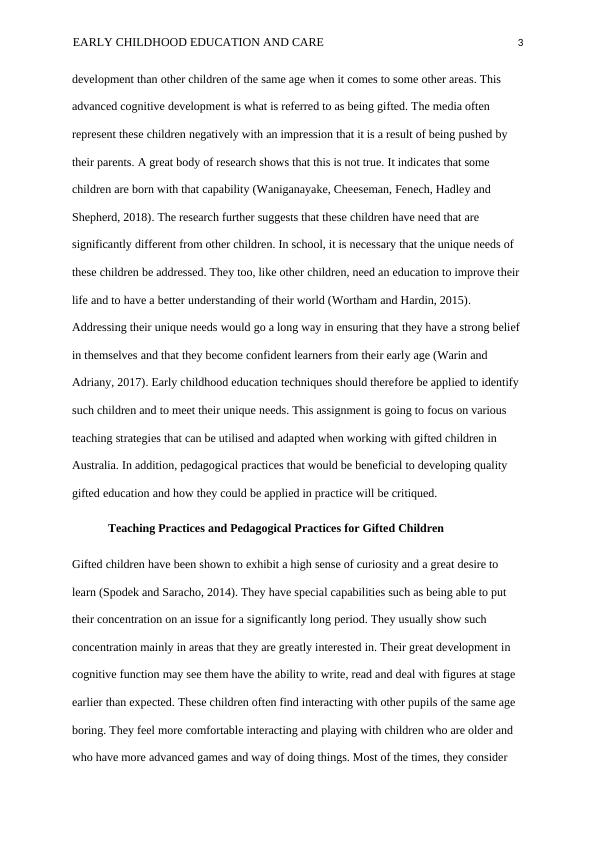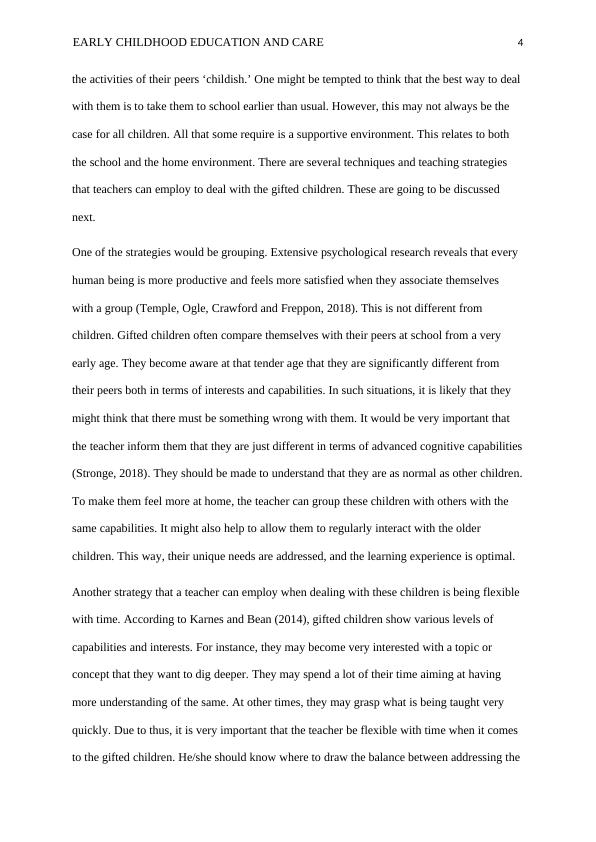Early Childhood Education and Care - Assignment
14 Pages4801 Words103 Views
Added on 2021-06-18
Early Childhood Education and Care - Assignment
Added on 2021-06-18
ShareRelated Documents
Running head: EARLY CHILDHOOD EDUCATION AND CAREEarly Childhood Education and CareStudent’s Name Institutional Affiliation

EARLY CHILDHOOD EDUCATION AND CARE2Early Childhood Education and CareIntroduction The process of growth and development is unique for every child. According to Allen and Cowdery (2014),there has always been and there will always be differences in how children grow and achieve various milestones in the different aspects of growth and development. These aspects include learning how to talk, walk, dressing themselves or even toilet training (Otto, 2014). It is normal for two children born at the same time to achieve these milestones of growth at significantly different times (Peterson, McIntyre and Forsyth, 2016). From the time a child is born, some exhibit characteristic and behaviours that indicate that their rate of development in one or more areas is occurring a rate higher than the normal. The first people to note this are usually the parents. Extensive research suggest that parents are the best sources of information about the growth and development patterns of their children (Van, Monighan-Nourot, Scales and Alward, 2014). The development of the thinking ability and mental processes of a child is referred to as cognitive development. For some children, cognitive development occurs at a very early age usually without any couching from their parents. It may be noted of such a child that they are able to remember occurrences with a greater detail than expected. They are also likely to retell these occurrences usually with some vocabulary that is more complex than what one would expect of a child of their age (Villa and Thousand, 2016). These children show exemplary capabilities such as solving complex puzzles and play games that have advanced rules. In a nutshell, they show an understanding of the world that would only be expected from children older than them.Despite the rapid development when it comes to cognitive function, these children may not necessarily show such development tin other areas. In fact, they may show less

EARLY CHILDHOOD EDUCATION AND CARE3development than other children of the same age when it comes to some other areas. This advanced cognitive development is what is referred to as being gifted. The media often represent these children negatively with an impression that it is a result of being pushed by their parents. A great body of research shows that this is not true. It indicates that some children are born with that capability (Waniganayake, Cheeseman, Fenech, Hadley and Shepherd, 2018). The research further suggests that these children have need that are significantly different from other children. In school, it is necessary that the unique needs of these children be addressed. They too, like other children, need an education to improve their life and to have a better understanding of their world (Wortham and Hardin, 2015). Addressing their unique needs would go a long way in ensuring that they have a strong belief in themselves and that they become confident learners from their early age (Warin and Adriany, 2017). Early childhood education techniques should therefore be applied to identify such children and to meet their unique needs. This assignment is going to focus on various teaching strategies that can be utilised and adapted when working with gifted children in Australia. In addition, pedagogical practices that would be beneficial to developing quality gifted education and how they could be applied in practice will be critiqued. Teaching Practices and Pedagogical Practices for Gifted ChildrenGifted children have been shown to exhibit a high sense of curiosity and a great desire to learn (Spodek and Saracho, 2014). They have special capabilities such as being able to put their concentration on an issue for a significantly long period. They usually show such concentration mainly in areas that they are greatly interested in. Their great development in cognitive function may see them have the ability to write, read and deal with figures at stage earlier than expected. These children often find interacting with other pupils of the same age boring. They feel more comfortable interacting and playing with children who are older and who have more advanced games and way of doing things. Most of the times, they consider

EARLY CHILDHOOD EDUCATION AND CARE4the activities of their peers ‘childish.’ One might be tempted to think that the best way to dealwith them is to take them to school earlier than usual. However, this may not always be the case for all children. All that some require is a supportive environment. This relates to both the school and the home environment. There are several techniques and teaching strategies that teachers can employ to deal with the gifted children. These are going to be discussed next.One of the strategies would be grouping. Extensive psychological research reveals that every human being is more productive and feels more satisfied when they associate themselves with a group (Temple, Ogle, Crawford and Freppon, 2018). This is not different from children. Gifted children often compare themselves with their peers at school from a very early age. They become aware at that tender age that they are significantly different from their peers both in terms of interests and capabilities. In such situations, it is likely that they might think that there must be something wrong with them. It would be very important that the teacher inform them that they are just different in terms of advanced cognitive capabilities(Stronge, 2018). They should be made to understand that they are as normal as other children.To make them feel more at home, the teacher can group these children with others with the same capabilities. It might also help to allow them to regularly interact with the older children. This way, their unique needs are addressed, and the learning experience is optimal. Another strategy that a teacher can employ when dealing with these children is being flexible with time. According to Karnes and Bean (2014), gifted children show various levels of capabilities and interests. For instance, they may become very interested with a topic or concept that they want to dig deeper. They may spend a lot of their time aiming at having more understanding of the same. At other times, they may grasp what is being taught very quickly. Due to thus, it is very important that the teacher be flexible with time when it comes to the gifted children. He/she should know where to draw the balance between addressing the

End of preview
Want to access all the pages? Upload your documents or become a member.
Related Documents
Cognitive delay in Children Report Assignmentlg...
|9
|2229
|200
Early Childhood Education and Carelg...
|13
|2628
|254
Personal Philosophy of Early Childhood Educationlg...
|5
|815
|77
Constructs of Early Childhoodlg...
|10
|2350
|440
Theories of Gestation Period Assignmentlg...
|8
|1736
|56
Developmental Changes from Early Childhood to School Age Childrenlg...
|5
|837
|237
